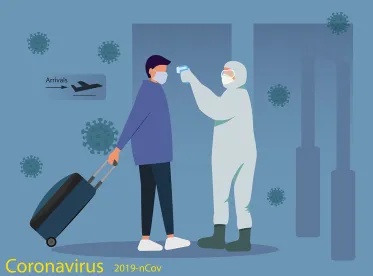As businesses begin the calculated process of re-opening their doors to employees and customers, many are considering implementing temperature checks to monitor for at least one known COVID-19 symptom – the fever.
Beyond nailing down the logistics of temperature checks (e.g., who will perform them, has that person been trained, do employees need to be paid while waiting in line, how will social distancing be maintained, etc.) there are several significant legal considerations that should be evaluated before implementation.
The Illinois Biometric Privacy Act
Some temperature screening devices utilize facial-recognition technology to quickly identify those with fever so that they can be promptly tracked down and removed from the facility. While these systems provide logistical advantages, especially to large employers and retailers, they likely implicate provisions of the Illinois Biometric Privacy Act (BIPA) which can lead to costly litigation and result in stiff penalties for anyone who violates the statute, even unwittingly.
According to BIPA, businesses utilizing this type of facial-recognition technology must obtain advance, written consent from the individuals to be scanned, and must also maintain a publicly available policy that specifies information regarding the collection, use, storage, and destruction of individuals' biometric information. And, again, these policies and consents must be executed and implemented before temperature screenings begin. It is, therefore, critical to determine whether your temperature screening devices perform facial recognition scans or capture other biometric information.
Confidentiality of Employee Information
Employers screening employee temperatures must also remember they are conducting a "medical examination," as defined by the Equal Employment Opportunity Commission (EEOC) and would be wise to adhere to the EEOC's guidance on the issue. This means information collected about employees' temperature, such as the temperature readings themselves, or the fact that an employee had or has a fever, must be treated as confidential medication information and maintained in a confidential file separate from an employee's personnel file. Employers should also take care to not divulge the identity of any employee sent home with fever, absent consent from the employee to share that information with other personnel, or a strict need-to-know among involved supervisor(s) or members of human resources.
The California Consumer Privacy Act
California's sweeping new privacy law, the California Consumer Privacy Act (CCPA), contains broad protection of consumers' "personal information," and requires businesses subject to the statute to, among other things, notify consumers when their personal information is being collected. Though body temperature is not explicitly mentioned in the statute, the definition of "personal information" is broad, and includes information that "identifies, relates to, describes, is capable of being associated with, or could reasonably be linked, directly or indirectly, with a particular consumer …" It includes biometric information. Whether an individual's temperature constitutes personal information is up for some debate, but debates often lead to costly litigation, and it is easy enough to amend CCPA notices to include temperature until that debate is resolved in an effort to avoid litigation altogether.
So, if a business is subject to the CCPA and intends to collect employee or customer temperatures (whether or not with the use of biometric technology), it should consider updating its CCPA notices to include "temperature" (and, if applicable, scans of face geometry) to the list of personal information collected.





 />i
/>i

